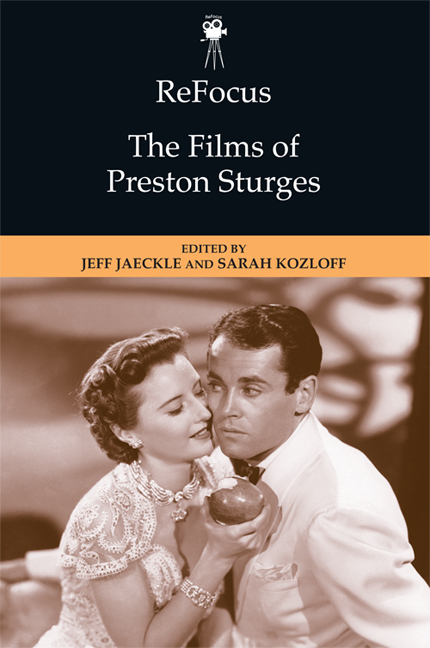Book contents
- Frontmatter
- Contents
- List of Figures
- Notes on Contributors
- Introduction: An Agile Mind—The Many Stands of Preston Sturges
- Part 1 Contexts: Genre, Studio, Authorship
- Part 2 Cultural Commentary: History and Identity
- Part 3 Technique: Scripting, Performance, Music
- Part 4 Impact: Reception/Reputation
- 12 Thrust with a Rapier and Run: The Critics and Preston Sturges
- 13 Hail the Conquering Auteur: Preston Sturges in La Revue du cinéma (1946–1949)
- 14 O Preston, Where Art Thou?
- Index
13 - Hail the Conquering Auteur: Preston Sturges in La Revue du cinéma (1946–1949)
from Part 4 - Impact: Reception/Reputation
Published online by Cambridge University Press: 05 September 2016
- Frontmatter
- Contents
- List of Figures
- Notes on Contributors
- Introduction: An Agile Mind—The Many Stands of Preston Sturges
- Part 1 Contexts: Genre, Studio, Authorship
- Part 2 Cultural Commentary: History and Identity
- Part 3 Technique: Scripting, Performance, Music
- Part 4 Impact: Reception/Reputation
- 12 Thrust with a Rapier and Run: The Critics and Preston Sturges
- 13 Hail the Conquering Auteur: Preston Sturges in La Revue du cinéma (1946–1949)
- 14 O Preston, Where Art Thou?
- Index
Summary
We might expect that, as the first screenwriter-director of the Classical Hollywood era, Preston Sturges would have been the darling of postwar French critics. However, due to a variety of factors, he faced relative neglect. I will trace the coverage he did receive, and try to account for the reasons he was overlooked. These reasons tell us a great deal about the reception of American films in France, and because the esteem of French critics had an outsize influence on British and American tastemakers, they also reveal why Sturges, as an auteur, has received less than his due in the U.S.
Preston Sturges's comedies were discovered in France after World War II; seven films, produced by Paramount between 1940 and 1944 arrived in quick succession, one after the other, but out of order. The first, in September 1945, was Christmas in July (1940) and the last, in January 1950, was The Great McGinty (1940). In spite of their disrupted chronology, elite French film critics greeted these films enthusiastically. In this regard, Preston Sturges benefited from the patronage of René Clair, whose radiance during the prewar years had never faded. Everyone knew that Sturges and Clair, who were close friends, shared certain actors (leading stars like Veronica Lake or Dick Powell and character actors like Franklin Pangborn or Melville Cooper), and of course that Sturges had been an uncredited producer on Clair's I Married a Witch (Ma femme est une sorcière, 1942).
Still, the discrepancy between the release of his films in France and the splendor and evolution of Sturges's career had consequences for his subsequent critical fortunes. This former wonder boy, ruined by his extra-cinematic business ventures—especially his notoriously catastrophic management of the restaurant The Players—would soon leave the U.S. After several aborted theatrical projects (notably Make a Wish, a musical adaptation of his screenplay for William Wyler, The Good Fairy [1935], and Carnival in Flanders, based on La Kermesse Héroïque [1935] written by Jacques Feyder), the francophile Sturges returned to France, a country he considered his second home and where he had previously lived with his mother during the early parts of his adventurous life when he served as director of his mother's luxury cosmetics company in Deauville, Maison Desti.
- Type
- Chapter
- Information
- ReFocus: The Films of Preston Sturges , pp. 280 - 292Publisher: Edinburgh University PressPrint publication year: 2015



